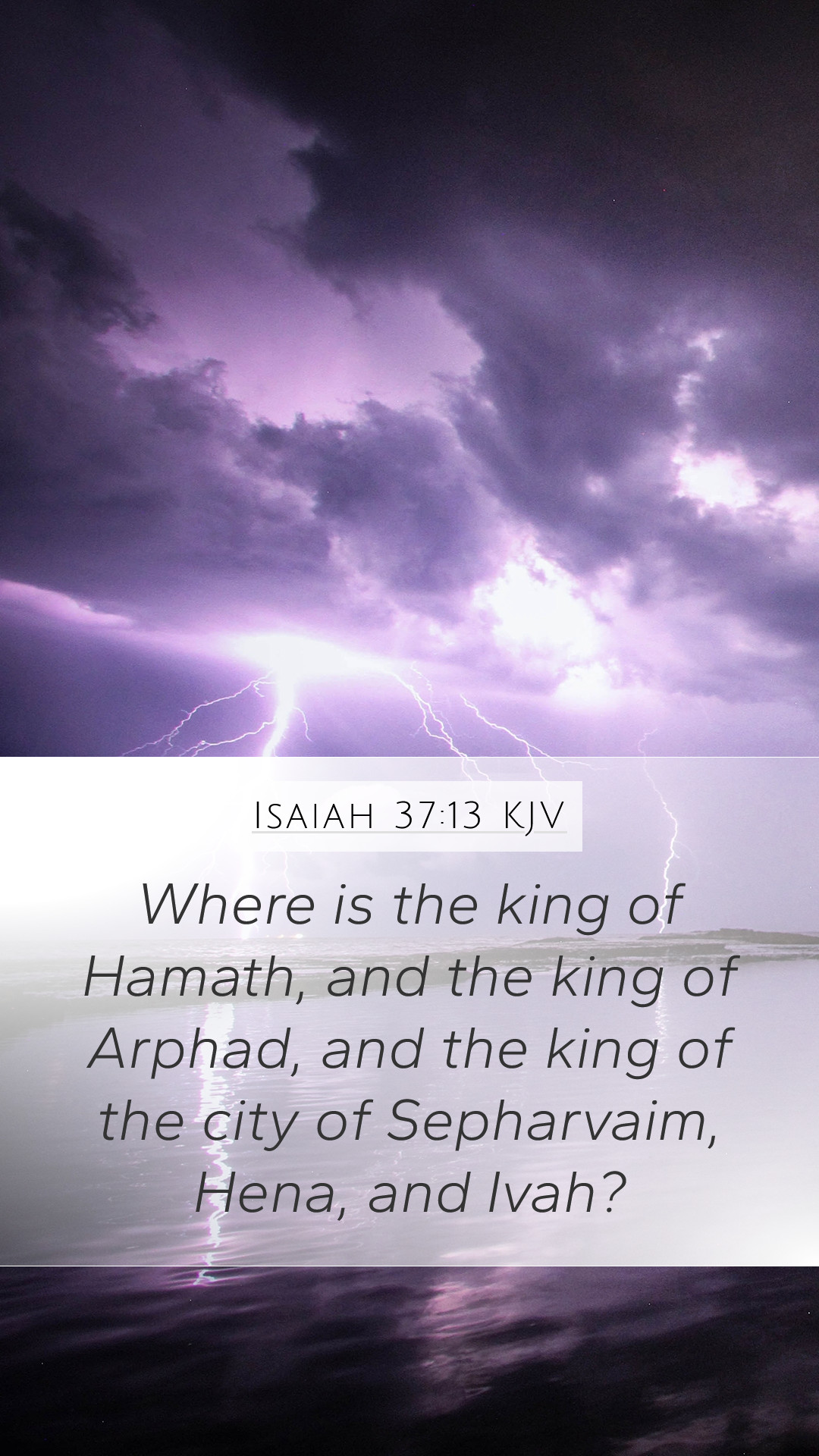Understanding Isaiah 37:13
Isaiah 37:13 states: "Where is the king of Hamath, the king of Arpad, and the king of the city of Sepharvaim, Hena, and Ivvah?" This verse is part of a larger narrative containing profound meanings and implications concerning God's judgment, sovereignty, and Israel's political dynamics.
Bible Verse Meanings
The inquiry posed in Isaiah 37:13 serves to highlight the futility of hope in foreign alliances. Before interpreting this verse, it is essential to understand the historical context during which it was written. During Isaiah's time, the kingdoms of Hamath, Arpad, and others were critical players in the geopolitical landscape, often engaged in conflict or alliances with Israel. This verse addresses the fate of these kingdoms amidst Assyrian aggression, which symbolizes the broader theme of God’s ultimate power over all nations.
Bible Verse Interpretations
Commentaries from Matthew Henry, Albert Barnes, and Adam Clarke provide valuable insights into this verse:
- Matthew Henry: He emphasizes that this rhetorical question emphasizes the impotence of human powers against God's will. The kings mentioned had their own authority, yet in the face of Assyria’s might, they were powerless.
- Albert Barnes: Barnes argues that this verse demonstrates the failure of the alliances that Israel had sought in times of distress. The kings are absent in the face of a significant crisis, illustrating the lesson that reliance on human strength is ultimately futile.
- Adam Clarke: Clarke highlights the lack of help from these nations, signaling their own vulnerabilities. The question reveals a deeper theological truth; no one can stand against God’s intentions.
Understanding Scripture
From these commentaries, it becomes evident that Isaiah 37:13 draws attention to the greater story of reliance upon God over external help. The verse is often a reminder for believers to seek divine guidance rather than relying solely on worldly alliances or solutions.
Bible Verse Explanations
Given the multifaceted nature of this scripture, a comprehensive explanation encompasses both its historical context and spiritual lessons:
- Historical Context: This verse occurs during a time when Judah was threatened by Assyria, and the leaders of neighboring nations were also at risk. It highlights the fragility of human authority in contrast to divine sovereignty.
- Spiritual Lesson: The absence of help from the foreign kings serves as a metaphor for God’s unfailing assistance. It encourages believers to rely on God rather than seek help from uncertain human alliances.
Scripture Analysis
In Isaiah 37:13, the absence of the kings illustrates the isolation faced by Judah. This serves as a stark reminder that ultimate security comes from God alone. It supports the overall narrative in Isaiah that emphasizes God's control over all events and nations, assuring His people of His presence in times of trouble.
Biblical Exegesis
Exegetically, this verse fits within a larger discussion about the faithlessness of Israel and the importance of divine intervention. The rhetorical questions raise the awareness of Judah’s leaders to the limitations of their power and allies. In times of crisis, they learned that their only hope lies in the Lord.
Bible Study Insights
For those engaging in bible study, Isaiah 37:13 presents a poignant lesson:
- Encouragement to reflect on the reliability of human resources versus God's promises.
- Invitation for deeper prayer for reliance solely on God during challenging circumstances.
- A prompt to analyze the historical situations that lead up to this prophetic statement, enriching one’s understanding of the divine narrative.
Related Bible Cross References
- Isaiah 30:2-3 - Highlights Israel’s tendency to rely on Egypt.
- Psalm 20:7 - Reminds believers that some trust in horses, while others trust in the Lord.
- Isaiah 36:6 - Discusses the trust in human strengths, warned against reliance on political powers.
Conclusion
In conclusion, Isaiah 37:13 illustrates the futility of relying on earthly alliances in the face of divine sovereignty. It teaches that even in moments of turmoil, God’s plans cannot be thwarted and emphasizes the importance of seeking Him when faced with insurmountable challenges. For deeper bible verse understanding, it is beneficial to explore this passage within the full context of Isaiah’s message, which reassures believers of God’s omnipresence and ultimate power over human affairs.


